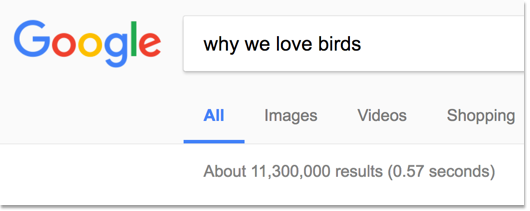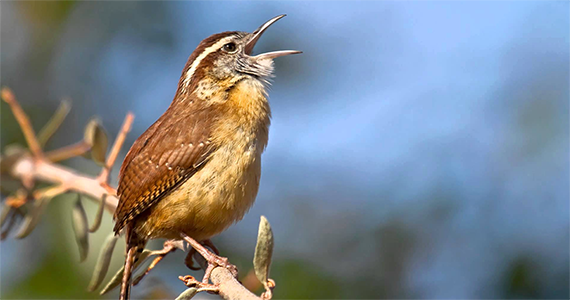2018 Designated ‘Year of the Bird’ to Honor 100th Anniversary of The Migratory Bird Treaty Act
In honor of the 100th Anniversary of the MBTA and to raise awareness about protecting our native birds, The National Audubon Society, National Geographic, BirdLife International, and the Cornell Lab of Ornithology—along with more than 100 other participating organizations—are joining together in a yearlong celebration.
Many of you reading this, like us, celebrate wild birds every day! But 2018 being designated the Year of the Bird is a wonderfully motivational and meaningful affirmation of the importance of birds in our life.
Imagine what we could do in a year with everyone focused on our native birds! We could:
- Remember that our shared love for wild birds brings us together when we feel we are divided.
- Talk about why birds matter and how we can help them.
- Commit to the future. Now is a good time to educate and share our passion for birding with our children and grandchildren.
- Participate, support and stay informed, in every way we can, while wild bird survival continues to be threatened by loss of habitat due to development, escalating environmental factors and conflicting human politics and priorities.
What is The Migratory Bird Treaty Act?
In a nutshell, the Migratory Bird Treaty Act (MBTA) prohibits the harming of nearly all native birds, along with their nests and eggs.
It followed The Migratory Bird Treaty of 1916, which was a landmark environmental treaty between the U.S. and Canada, when everyone recognized the importance of having uniform protection of birds during their journey to and from nesting habitats across North America; and wild birds’ vital role in keeping ecosystems balanced and healthy.
The MBTA became U.S. Federal law in 1918 and amendments to the original treaty extended its range to include other nations; Mexico, Japan and Russia.
See the U.S Fish & Wildlife Services page to see the specifics of the Act along with the full list of birds (over a thousand) it protects. Note: It does NOT protect non-native species such as English House Sparrows and European Starlings.
Why the Concern Now about the MBTA?
The Act has been amended many times during the past 100 years, but most amendments were made to strengthen protection and increase liability for anyone harming native birds. It continues to save countless lives, however amendments during the past year may diminish its power to protect.
Here’s Breaking News from Audubon.org
January 11, 2018 | Today former leaders from the U.S. Department of the Interior submitted a letter to Interior Secretary Ryan Zinke denouncing the agency’s recent announcement reinterpreting—and essentially gutting—the Migratory Bird Treaty Act (MBTA), the nation’s oldest conservation law, signed a century ago in 1918.
The signatories include two former deputy secretaries and three former assistant secretaries of the Interior Department, and five former directors of the U.S. Fish and Wildlife Service. It also includes seven former chiefs of migratory bird management, whose service spans nearly half a century, from 1972 to 2017, under every president from Nixon to Obama. The position is currently vacant under the Trump administration.
To stay up-to-date on status of The Act, follow The Audubon Society as it continues to monitor new developments..
Birds Bring Us Together
Trying to find rays of sunshine in this distressing news seems impossible, but maybe their letter will inspire other people to come together, across multiple generations and political perspectives.
While researching and writing this, we came across many inspiring articles from people of diverse walks of life, all sharing why birds matter to them.

Googling ‘why we love birds’, there are more than 11 million results. There’s a lot of sharing!
How Small Actions Can Make a Big Difference spurred us on to finish this post and also an email for subscribers.
Sharing Why Birds Matter to Us All
Reading Author Jonathan Franzen’s heartfelt (and fact-filled) article in the January issue of National Geographic magazine ‘Why Birds Matter and Are Worth Protecting’ left us speechless. Please don’t miss it. Find it online here. Joel Sartore’s photographs of birds around the world illustrating the article may speak even more directly to the heart.
Audubon.org asked a diverse group of people who also responded with an outpouring of love and appreciation for wild birds that ranged from the scientific and aesthetic to the spiritual and philosophical. We include several favorites here, but there are many more.
From horror film director Wes Craven (!), a very thoughtful response:
—Wes Craven, Hollywood director
From Jacqui Bonomo, of Audubon Maryland-DC:
—Jacqui Bonomo, Executive director and vice president, Audubon Maryland-DC
And from a loving grandfather, Joe Francis
—Joe Francis, Former director, Wachiska Audubon Society
Committing to the Future
Protecting Wild Birds for Our Grandchildren and Their Grandchildren
Inspiring the next generation of birders and ensuring there will be birds here for them. It’s really simple.
We all probably agree this is critical, but how? Again, maybe it’s best to keep it simple. There are some wonderful things going on out there on behalf of wild birds, but the best way for each of us to take action all year long is to be consistent with our backyard habitats—provide food, water and shelter all year long.
The organizers of ‘Year of the Bird’ ask us to ‘Help build a better world for birds by taking a simple but meaningful action each month‘. January’s Action: Recommit ourselves to helping birds and to protecting the places they need.
We’ve blogged about this before and we can’t blog enough: Each of our backyard habitats contributes to the health and well-being of not only the individual visitors to our feeders and baths, but is also one more piece of habitat restored and connected to Migratory Flyways. As green space increasingly disappears due to development, our backyard micro habitats link together, backyard by backyard, across our county – our state – our country.
We can literally all ‘come together’ for our birds.
Please share this with everyone you know who loves birds
For more about ‘Year of the Bird’:
www.birdyourworld.org/
Audubon.org
NationalGeographic.org
BirdLife.org
The Cornell Lab of Ornithology






